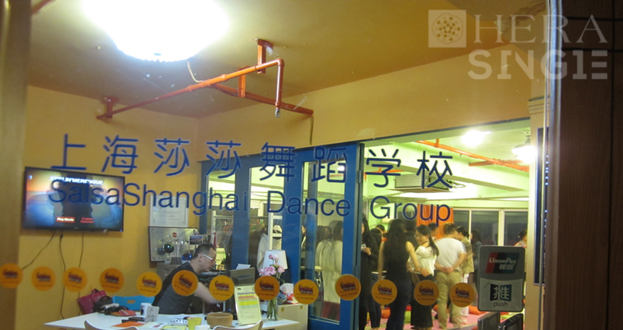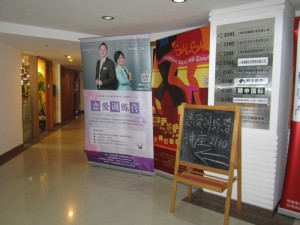
During the joint field work period from 1st to 10th December 2014, the HERA-SINGLE team visited Love Club in Shanghai, an education establishment for the single person.
Love Club (lian’ai xunlianying, 恋爱训练营) was co-founded in 2011 by phycology consultant Wu Di, who is famous as a veteran columnist and television pundit commenting on intimate relationships and salsa trainer Bob who owns a salsa school and a salsa bar in downtown Shanghai. Speaking of the reason to start Love Club, Wu Di recalls that since 2007 she observed that more and more single people turned to her for consulting while her traditional clients were mainly married couples. That time was also the heyday of the leftover women discourse. After identifying the niche market and finding the partner Bob whose school serves as the classroom, Wu Di launched the Club not as a match-making agency but a training course, or literally a training camp, where students are instructed to have their perceptions, attitudes and behavior patterns relating to intimate relationships changed and therefore become more capable of developing a relationship and handling issues stemming from it. Over the years the format of Love Club has evolved from two-day workshop to three-month course which now has a curriculum consisted of different modules, including one-on-one consulting, group discussion through social media, dance therapy, lecture, party in Bob’s salsa bar, as well as other social events.
Since its establishment, Love Club has attracted more than 300 hundred students and many more audience who pay to attend the lectures1 and social events. Its students are mainly college-educated and have white-collar jobs, aged between mid-20s and mid-30s, the so-called petit white collar or petit urbanite. This social-economic background allows them to afford such a course. The fee per person for Love Club at the end of 2014 is CNY 4500 and is increasing all the time. Besides, during their three-month course period, students are recommended other consulting services or courses that are said to complement or advance their training at Love Club. To get a “value-added service” they often pay another several thousands and find themselves embraced by a rapidly emerging and thriving service sector focusing on personal emotion.

Photo: Chenying PI
Although the Club does not target just female singles, enrolled students normally show a skewed male-female ratio, ranging from 2:8 to 3:7. This corresponds to the reality that single women are far more visible and problematized in contemporary China. However, both the founders and some female students do not think such a ratio merely reflects the pressures single women face. Taking a course learning how to love, though often subject to doubt and even ridicule, is a positivize sign of one being open to new things and willing to change oneself, in their opinion. In this regard, young men are thought to be more conservative and less willing to acknowledge their shortcomings. Hence, the percentage of men in courses like Love Club or consulting sessions is very low. What’s more, Love Club is not only useful for love life, but also deals more broadly with interpersonal skills and approach to life. In graduation ceremonies students who have finished their three-month training need to share their feelings. A common story told by a lot of graduates is that one is still single yet knows oneself better, is more positive towards work and private life, and promises to work persistently on self-improvement.
Being single, or being “left,” at Love Club is not labeled as a personal failure of its students, but rather explained as an inevitable outcome of China’s recent history, especially the lack of concern on emotion in family and school education in the upbringings, based on the post-50s generation’s world views, value systems and life experiences, of the post-80s generation. That the social origins of the problem, i.e. being single or clumsy in relationships, being said over and over again, the solution lies firmly in an individual level. Be the change yourself; keep studying, practicing and thus improving as well as accommodating.
The lectures usually take place on weekend evenings and are open to anyone as long as this person pays a CNY 100 admission fee. But it is free to alumni or parents of students of Love Club. There is a set repertoire of topics, which covers different phases or issues concerning a romantic relationship, like how to prepare for a blind date, what to talk about in a blind date, steps from knowing someone to getting married, and etc. New topics are also introduced in response to new social phenomena or students’ requests. On Dec 7, 2014, the SINGLE team visited Love Club and audited that evening’s lecture, titled “How to Quarrel without Hurting the Other Party.”